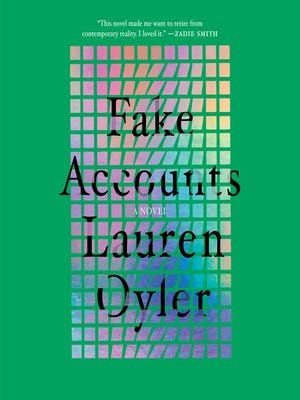Time Wasted/Time Well Spent
Lauren Oyler and Say Sue Me
When will daylight saving’s dramatic power over my disposition stop surprising me? Every year feels like I’m realizing this change for the first time. I’m not as tired at 6 p.m. or 7 a.m. I’m more pleasant to be around. At least, I find myself more pleasant. Others may think I’m as insufferable as I was in January.
Hanif Abdurraqib and Amanda Petrusich recently (separately) asked important questions about the Grammys and relevancy. Abdurraquib also highlighted some of the greatest Grammys moments in history:
Where We Were Together - Say Sue Me
I liked Where We Were Together in a passive way when I first heard it a couple of years ago, but didn’t fall in love with the album until later, at a time when I was dealing with frequent, physical bouts of anxiety. Say Sue Me’s sound, which has been dubbed “surf-gaze,” is paradoxically chaotic and comforting, sweet but honest. The album feels like a hug, but never placating or condescendingly so.
Choi Su-mi sings in a soft, energetic voice that, when paired with the surf rock instrumentals, can feel delightfully doo-wop. Kim Byung-kyu’s fuzzy, warped guitar soars and offers an occasional new wave flourish.
Maybe some lyrics — “I’m full of things I hate, but I like you/” — are a little teenage. It’s a testament to the songs’ depths that I don’t care. When Choi sings them, they feel warm and intimate, like they’re exposing something but keeping it safe. Other songs on the album lean more into storytelling. “Funny and Cute,” is an ode to a hospitalized band mate and features poignant lyrics like “I’m afraid of making new memories without you.” The song ends with a wistful promise to meet their friend at their favorite bar.
While I love the vocals, my favorite moments on the record are during instrumental solos. They remind me of phrases on On Fire, hazy but full of personality and genuine feeling. On the opener, “Let It Begin,” the aforementioned “The Courage To Become Somebody's Past,” and “Coming To The End” (which sits, appropriately, toward the end), the simple but striking guitar and bass lines soar, creating almost trance-like moments, forcing the listener to sit in the moment while also being propelled forward, a fast ride with a trusted seatbelt.
Fake Accounts by Lauren Oyler
From the publisher:
On the eve of Donald Trump's inauguration, a young woman snoops through her boyfriend's phone and makes a startling discovery: he's an anonymous internet conspiracy theorist, and a popular one at that. Already fluent in internet fakery, irony, and outrage, she's not exactly shocked by the revelation. Actually, she's relieved--he was always a little distant--and she plots to end their floundering relationship while on a trip to the Women's March in DC. But this is only the first in a series of bizarre twists that expose a world whose truths are shaped by online lies.
Suddenly left with no reason to stay in New York and increasingly alienated from her friends and colleagues, our unnamed narrator flees to Berlin, embarking on her own cycles of manipulation in the deceptive spaces of her daily life, from dating apps to expat meetups, open-plan offices to bureaucratic waiting rooms. She begins to think she can't trust anyone--shouldn't the feeling be mutual?
Lauren Oyler is a writer and critic with a body of work I respect and admire. But the thing that makes her book reviews so compelling — nuanced examinations of where and how a text fits into modern life, the ability to anticipate arguments from authors and readers alike and respond in kind — is what bogs down her debut novel. The first third or so of the book balances observations about being a young, intelligent, and privileged woman with a strange, though believable, plot. But the story loses all of its momentum and becomes a slog, one that even the final twist doesn’t make interesting.
Self awareness is helpful when thinking about the implications of agency and social media in a divisive political landscape, the overarching theme of the novel. But I don’t need the ruminations and opinions that stem from self awareness spelled out every other page, especially when these same ideas have been the topic of think pieces every week since 2016.
I don’t care about a ‘likable’ narrator, whatever that word even means. But I care if they’re boring, and — despite an occasional scathingly funny one-liner — this was boring. After about three descriptions of her scrolling through her phone, rewording the reasoning as to why she did so — reasoning that resonates but is far from revelatory — I was annoyed not with her behavior, but with the time I’d invested in the text. In the end, there were very many quotable moments, very many ‘insights’ into life as a young woman on Twitter. But these moments are stitched together redundantly, resulting in what feels like the narrator winking so much at the audience that you have to wonder if she has something stuck in her eye.
One oft-cited section of the book mocks the popular style of fragmented novels. The text itself then (SELF AWARENESS!) mocks the form by styling itself as a fragmented novel for several pages after stating its inferiority. I don’t have a soft spot for the fragmented form, but there is something between Oyler’s book, which completely lacks subtext, and the works she looks down on, and she has not found that balance.
If you buy a book through an affiliate link, I may make a small commission.
Thanks for reading! What should I check out next? How can I do better? See you later.






